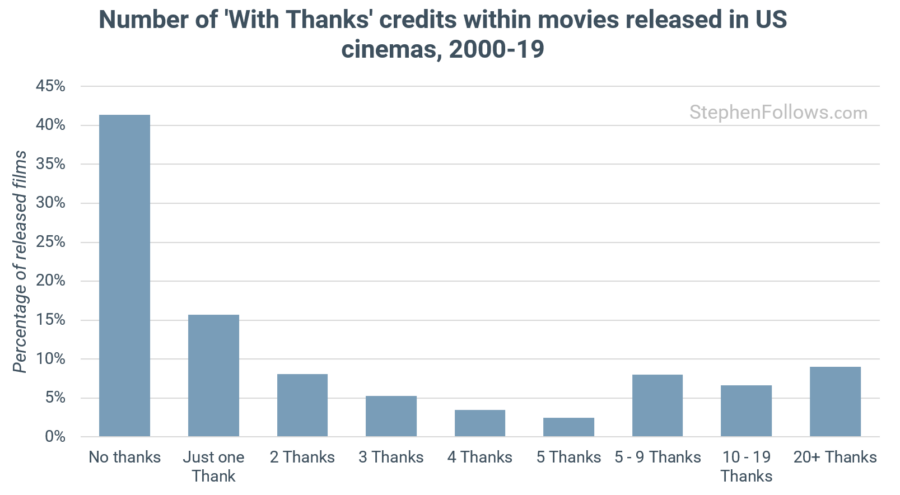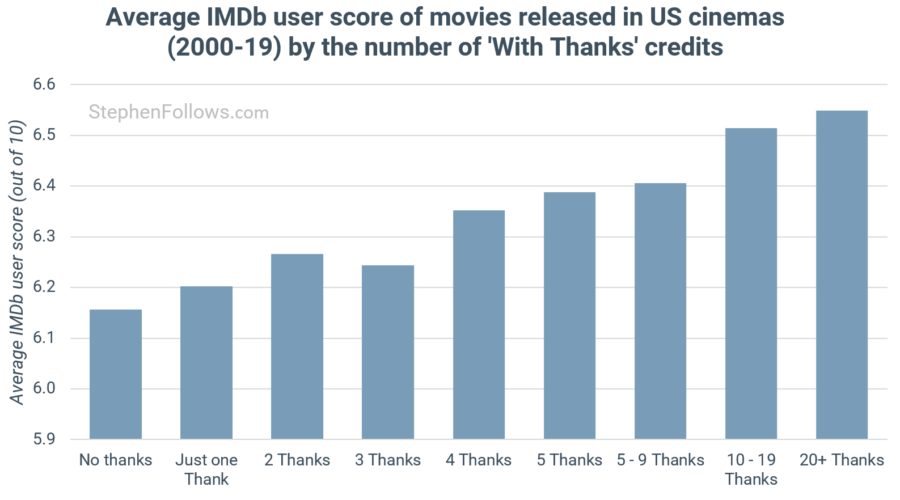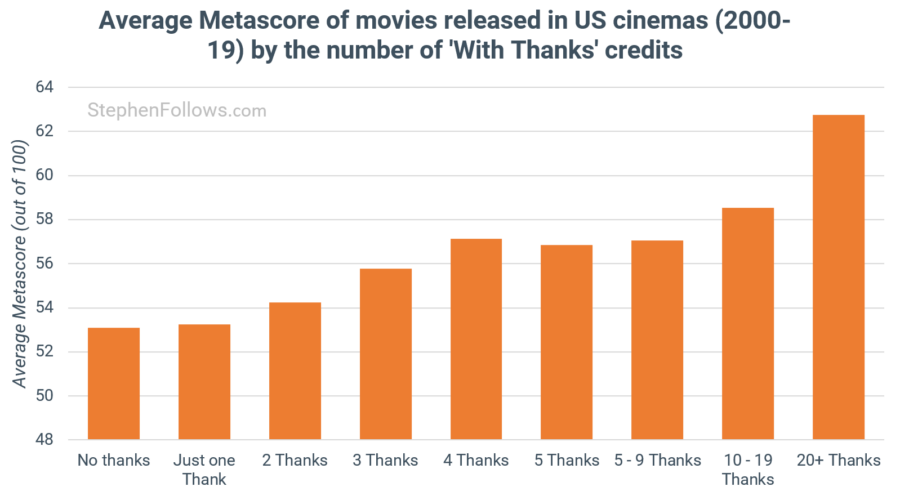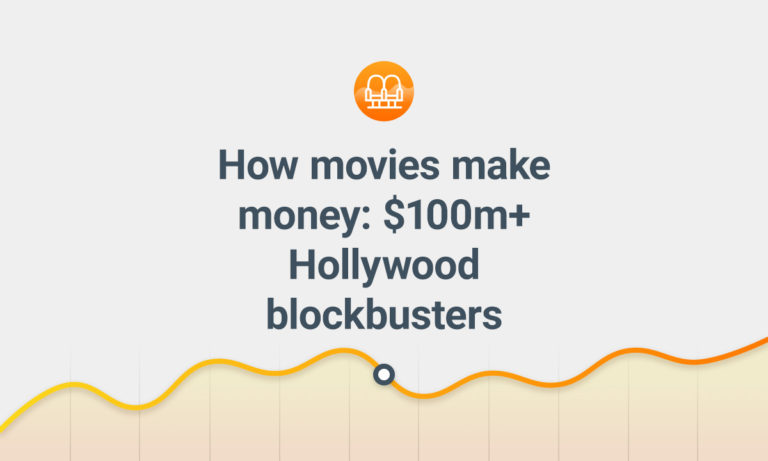David Wilkinson got in touch yesterday asking for advice on his new crowdfunding campaign. One of the topics he wanted to chat about was the ‘cost’ of offering a “Thanks” credit to his backers.
This involves awarding someone who backs the film a credit on the movie under the “With Thanks” section. This name check would appear at the end of the movie and, crucially, on IMDb.
On the face of it, there is no cost to offering an almost infinite number of these as it would just be a case of a longer end credit crawl and IMDb doesn’t charge for listing credits.
However, David brought up an anecdote from his time as a distributor. In conversations with fellow film sales professionals, the topic of ‘how to spot a bad movie’ came up. One participant said that they regard having too many ‘With Thanks’ credits as a red flag. The others agreed and added that the number of producers listed on a movie was similarly useful in spotting a bad film.
These are just the kind of industry beliefs that I love to test. This week I’m going to tackle the ‘With Thanks’ credits and then next week I’ll turn to producing credits.
I gathered data on 8,096 movies released in US cinemas between 2000-19 (i.e. pre-pandemic), taking note of their number of credited/thanked individuals, their IMDb score (to stand in for audience views) and Metascore (to sample the views of critics).
How thankful is the film industry?
Let’s start by getting a sense of how many films give out ‘Thanks’ credits.
41.4% of movies don’t thank anyone. Well, not this way – we can’t track the number of muffin baskets sent IRL.

Helpfully, the two films which had the largest number of credits in the database illustrate the two types of movies which tend to give out large numbers of credits:
- Crowdfunded movies – The Void (2016) is a IndieGoGo-backed movie, resulting in 375 of their 443 thanks credits coming in the form of “Thanks to our indiegogo supporters“. It’s also possible that some of the other people thanked also contributed to the campaign, with larger donations providing them with one of the 47 “Thanks”, 21 “Special Thanks” and one “Thank you”.
- Complicated movies – Paris, je t’aime (2006) is a portmanteau film, meaning that it is made up of eighteen short segments. The result is that not only does the movie have an abundance of ‘Thanks’ (400 credits) but also heavy on directors (22), writers (32) and producers (26).
Are thankful filmmakers bad filmmakers?
To act as a quick measure of quality we’re going use IMDb score (out of 10) to represent the views of film audiences and Metascore (out of 100) to measure the views of film critics.
As the chart below clearly shows, films with a greater number of ‘Thanks’ credits receive higher scores from audiences than those with no or low thanks.

“Ah…“, I hear you cry, “But what if this is just a reflection of all those thankful people giving the film ten out of ten on IMDb as they like it and/or want to be credited on a high-scoring movie“.
Such a cynical response… which I initially had too.
But we can be sure that this is not the case for two reasons.
Firstly, the number of votes on IMDb vastly outweighs the number of people thanked. Across the whole database, the average movie had 54,391 votes on IMDb, and the movies with 20 or more thanks credits had 68,590 votes. In the latter case, ‘Voters’ outnumber ‘The Thanked’ 89 to 1.
Secondly, film critics agree.

A simple and pleasing result. The industry belief that having more than the average number of people thanked in the credits means the movie is bad is flat-out wrong.
Notes
This is looking at all live-action, fiction feature films which grossed at least $1 at the US box office between 2000 and 2019, inclusive.
Epilogue
Next week I’m going to take the same approach to the number of producer credits. Place your bets in the comments as to what I’ll find…!





Comments
Very interesting, thank you.
With regard to “producer” credits, I regard those credits are a potential perk for crowdfunded movies but also need to maintain the professional nature of the work of a Producer. I see crowdfunders offering ‘Producer’ perks and will not support that perk level as I firmly believe the Producer role is a real job, requiring hands on work and time, and should not be just paid for.
However Executive Producer is more of a “thanks for funding us” and should be a valuable perk for a crowdfunded movie.
Associate Producer – could be either but if there are many of them then ‘funding’ more than ‘doing the job’
Line Producer – should be ‘doing the job’.
Hopefully your analysis will differentiate between the different categories of Producer…. and I’m sure it will.
Very pleasing. I wonder how widespread David’s notion is?
Love this! Well done. Now we have some science!
Thanks for taking a closer look…and coming up with a crisp and positive response. Bravo.
“Special Thanks” credits are a negotiating tool for underfunded films. It means in “lieu of payment” or “thanks for the freebie.” The more Special Thanks, the lower the budget. Your statistical result suggests that when an audience likes a low budget film, it likes it a lot. Really bad low budget films tend to have fewer Special Thanks credits because prospective contributors, early on, couldn’t have cared less about having such a credit on films such as “The Hatchet Killer of South San Fran.”
Hi Stephen,
Well done. Another prejudice debunked.
On reflection, I’m not surprised.
The thanks go in principle to the people and organizations that have significantly helped in the realization of the project, at all its stages, often for free. These include, for instance
– cultural or other organizations and their representatives (universities, museums, archives, scholars,…) who contributed to the work of the scriptwriters and technicians to ensure the veracity or coherence of the action and the settings
– public or private organizations or persons who have made available places or equipments, either as sets or as facilities, from the local pub to a nuclear power plant (Abyss), or given authorizations for filming or provided logistical & security assistance (firemen, …)
– or who have lent, or even offered and adapted materials such as vehicles (Aston Martin / James Bond), costumes, elements of scenery, etc.)
– technical companies that bring their know-how and their means at reasonable costs (Cameron-Pace Group, Slated, etc.) or lend equipment
– High-level professionals who provide advice or connections (Sam Mendes, Robert Redford, etc.)
– & more.
These contributions help to improve the quality of films while reducing their production costs. On a large production, these contributions are indeed counted in the hundreds.
So IMO, we could even say that the number of thanks highlights the care that the filmmakers took in the realization of their project.
Best,
JM
Good work!!!!